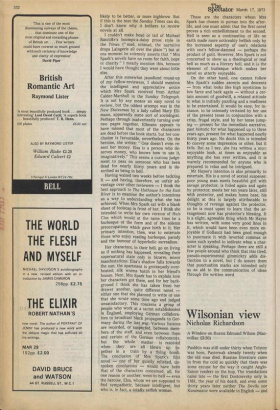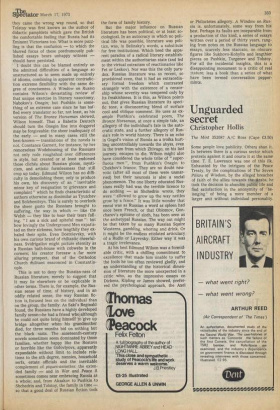Wilsonian view
Nicholas Richardson
A Window on Russia Edmund Wilson (Macmillan 0.50) Pushkin was still under thirty when Tolstoy was born, Pasternak already twenty when the old man died. Russian literature came in from the cold so quickly that there was some excuse for the way it caught AngloSaxon readers on the hop. The translations came late — the first Dostoievsky only in 1881, the year of his death, and even some thirty years later neither The Devils nor Karamazov were available in English — and they came the wrong way round, so that Tolstoy was first known as the author of didactic pamphlets which gave the British the comfortable feeling that Russia had its Eminent Victorians too. What is more puzzling is that the confusion — to which the blurred focus of these posthumously published essays bears unhappy witness — should have persisted.
I doubt this can be blamed entirely on the admitted difficulties of a language so unstructured as to seem made up entirely of idioms, combining in apparent contradiction extreme flexibility with the same degree of conciseness. A Window on Russia contains Wilson's devastating review of that unique exercise in literary vasectomy, Nabokov's Onegin; but Pushkin is something of an extreme case since he has baffled every translator so far, not least, as his version of The Bronze Horseman showed, Wilson himself. That a Babette Deutsch should turn the Onegin line into doggerel may be forgiveable: the sheer inadequacy of the early — and in many cases still the best-known — translations of the novels is not. Constance Garnett, for instance, by her remorseless Wodehousing of the Russians not only rode roughshod over differences in style, but created or at least endorsed those clichés about Russian gloom, mysticism, and artistic formlessness that still crop up today. Edmund Wilson has no difficulty in demolishing these; only to produce his own, his discovery of an "inevitable minor key of resignation to grievance and complaint" which he finds characteristic of authors otherwise as dissimilar as Tyutchev and Solzhenitsyn. This is surely to overlook the sheer gusto the Russians brought to suffering, the way in which — like the Welsh — they like to hear their tears falling. "I am a sick and spiteful man ": but how lovingly the Underground Men expatiated on their sickness, how lengthily they exhaled their spite. Even Dostoievsky, with his own curious brand of chiliastic cheerfulness. Svidrigailov might picture eternity as a Russian bath-house with cobwebs in the corners; his creator foresaw a ..far more alluring prospect, that of the Orthodox Church Militant ensconced in Constantinople.
This is not to deny the Russian-ness of Russian literature, merely to suggest that It may lie elsewhere or be explicable in other terms. There is, for example, the Russian sense of time, of history, and in an oddly related sense, the way Russian fiction is focused less on the individual than on the group, the family. As Saki's Reginald found, the Russians have a highly developed family sense—he had a friend who although he could not quite bring himself to give up bridge altogether when his grandmother died, for three months bid on nothing but the black suits. The nineteenth-century novels sometimes seem dominated by those families, whether happy like the Rostovs or horrible like the Golovlyovs, apparently expandable without limit to include relations to the nth degree, nannies, household serfs, estate officials and the inevitable complement of piques-assiettes: the extended family — and in War and Peace it sometimes comes near embracing Russia as a whole; and, from Aksakov to Pushkin to Shchedrin and Tolstoy, the family in time — so that a good deal of Russian fiction took the form of family history.
But the major influence on Russian literature has been political, or at least sociological. In an autocracy in which no political life was possible, literature was politics, was, in Belinsky's words, a substitute for free institutions. Which bred the apparent paradox of a radical literary establishment within the authoritarian state (and led to the virtual ostracism of reactionaries like Fet or Leskov). Nor was this the only paradox. Russian literature was so recent, so provisional even, that it had an extraordinary formal freedom which contrasted strangely with the existence of a censorship whose severity was tempered only by its freakishness. It is this, as Wilson points out, that gives Russian literature its specific tone, a disconcerting blend of surface cool and oblique comment. He uses as example Pushkin's celebrated poem, The Bronze Horseman, at once a simple tale, an allegory of the individual's fate in the autocratic state, and a further allegory of Russia's role in world history. There is an echo in Gogol's vision of Russia as a troika hurtling uncontrollably towards the abyss, even in the tram from which Zhivago, on his last journey, escapes to die. Wilson might also have considered the whole tribe of "superfluous men ", from Pushkin's Onegin to Chekhov's Ivanov. They are no doubt neurotic (after all most of them were unmarried) but their neurosis is also a social phenomenon. The one liberty educated Russians really had was the terrible licence to do nothing — as Shchedrin wrote, they were "allowed to grow up the way nettles grow by a fence." It was little wonder that ennui was as Russian a word as spleen had once been French, or that Oblomov, Goncharov's epitome of sloth, has been seen as the archetypal Russian. The way out might be that taken by so many Russian Squire Westerns, gambling, whoring and drink. Or it might be the endless etiolated articulacy of a Rudin or Layevsky. Either way it was a tragic irrelevance.
At his best Edmund Wilson was a formidable critic, with a chilling commitment to excellence that made him unable to suffer the fools he too often reviewed gladly, and an understanding of the historical dimension of literature the more unexpected in a critic who, as the impressive essays on Dickens, Kipling or James showed, preferred the psychological approach, the Axel or Philoctetes allegory. A Window on Russia is, unfortunately, some way from his best. Perhaps its faults are inseparable from a production of this kind, a series of essays written over a period of thirty years, ranging from notes on the Russian language to essays, scarcely less staccato, on obscure figures like Sukhovo-Kobylin and lengthier pieces on Pushkin, Turgenev and Tolstoy. For all the incidental insights, this is a disappointing monument to a critic of real 2tature; less a book than a series of what have been termed conversation peppermints.



































 Previous page
Previous page